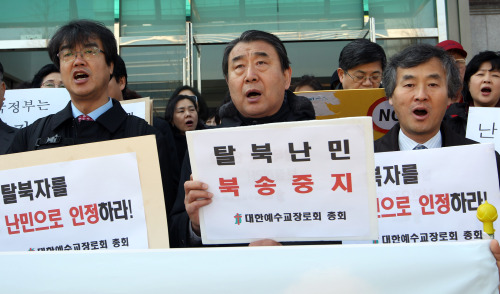Opponents argue it will provoke Pyongyang and hurt inter-Korean tiesEfforts to enact a law aimed at improving human rights conditions in North Korea have made little headway due to ideological confrontation and political bickering since the first legislative move began nearly seven years ago.
The issue of human rights violations in the communist state has been back into the spotlight as rallies have recently taken place online and offline to drum up international support to block China’s forcible repatriation of North Korean defectors.
But political circles here appear to have little interest in moving forward the human rights bill for North Koreans, while focusing on turning the political tide in their favor ahead of the April general elections.
“While politicians play party politics, putting political interests first, there appears to be no lawmaker putting himself or herself at the forefront to enact the law. They just care about their own voters,” said Ahn Chan-il, director of the World North Korea Research Center.
Former Saenuri Party lawmaker Kim Moon-soo, currently governor of Gyeonggi Province, and his fellow legislators submitted the first North Korean human rights bill to the National Assembly in August 2005. But it was scrapped as the 17th Assembly closed in May 2008.
The bill was resubmitted to the current Assembly in July 2008.
It passed through the Assembly’s committee on foreign affairs and unification in February 2010, but has since gathered dust at the legislature, with left-wingers arguing it would provoke the North, damage the already strained bilateral relations and deepen ideological division in the South.

Members of a civic group dedicated to helping North Korean refugees urge China not to repatriate defectors to the repressive state against their will near the Chinese Embassy in central Seoul on Tuesday. (Yonhap News)
The bill calls for crafting a basic plan to improve human rights in the North; appointing a special ambassador on the issue; and launching an archive to investigate and collect human rights abuse cases in the North; and offering support for activities by human rights groups in the South and overseas.
While the ruling and opposition parties have continued to clash over the bill, foreign countries have already legislated against human rights abuses in the North, underscoring the international obligation to safeguard “universal values.”
The U.S. passed the North Korea Human Rights Act in 2004 while Japan passed a similar one in 2006. Britain has also paid keen attention to the issue with some 20 of its parliamentarians sending a letter last July to leaders of the four major parties here to call for the enactment of the law.
Kim Sung-han, second vice foreign minister, said earlier this month that it is a “shame” that the human rights bill is still pending at the Assembly. “I personally think that it is an irony and a shame that Korea hoping for reunification leaves the bill still pending at the legislature for years,” Kim told reporters.
Park Hyo-chong, ethics education professor at Seoul National University, said that the legislature’s failure to properly handle the bill amid partisan bickering was a “dereliction of duty.”
“The human rights issue is something that should be beyond partisan politics. It should not involve any ideological or political calculations,” said Park.
“It is an issue that transcends nationality and state boundaries. We are the very party concerned with the issue. I am saddened that we turn a blind eye to the pains of our northern brethren.”
Though the law, should it be enacted, may not trigger an immediate change in the North, it would show the South’s clear stance on the issue and add to the growing pressure on the North to secure the human rights of its people, experts said.
“When the law takes effect, we will have a state budget and systematic programs to help suffering North Koreans. That will give a boost to human rights activists, who will then step up their efforts to appeal to the international community,” said Ahn.
Hong Seong-phil, law school professor of Yonsei University, said that the law will help ease partisan conflict over the issue in the South.
“After clearly presenting our country’s position on it through the law, there will be an effect of unifying public opinion. We can also reduce or end the moves to politicize the issue and find common ground on it,” he said.
Hong added that opponents of the bill had overestimated the negative impact the envisioned law will bring about.
“Some even said that a war would break out when we pass the bill. Things have been blown way out of proportion about its impact. It is just to show our official position on the issue as other nations have done,” Hong said.
Yang Moo-jin, professor at the University of North Korean Studies, however, said that South Korea should be careful in passing the bill, given that the relations between the two Koreas have seriously deteriorated in recent years.
“The law is needed, but when the South and the North now have soured bilateral relations, it would not be helpful (in improving them),” said Yang.
“We have to carefully watch the moves concerning it in the international community and the situations in North Korea as well. We need to be careful in our actions, as we are the very party who should face the North, whether that is about reconciliation or cooperation.”
North Korea has repeatedly showed its anger at the South’s move to enact the law.
Rodong Sinmun, the official daily of the North’s ruling Workers’ Party, said in a commentary last year that the passage of the laws “would be an official declaration that South Korea does not acknowledge (the North’s) dignity, autonomy and socialist system.”
By Song Sang-ho (
sshluck@heraldcorp.com)






